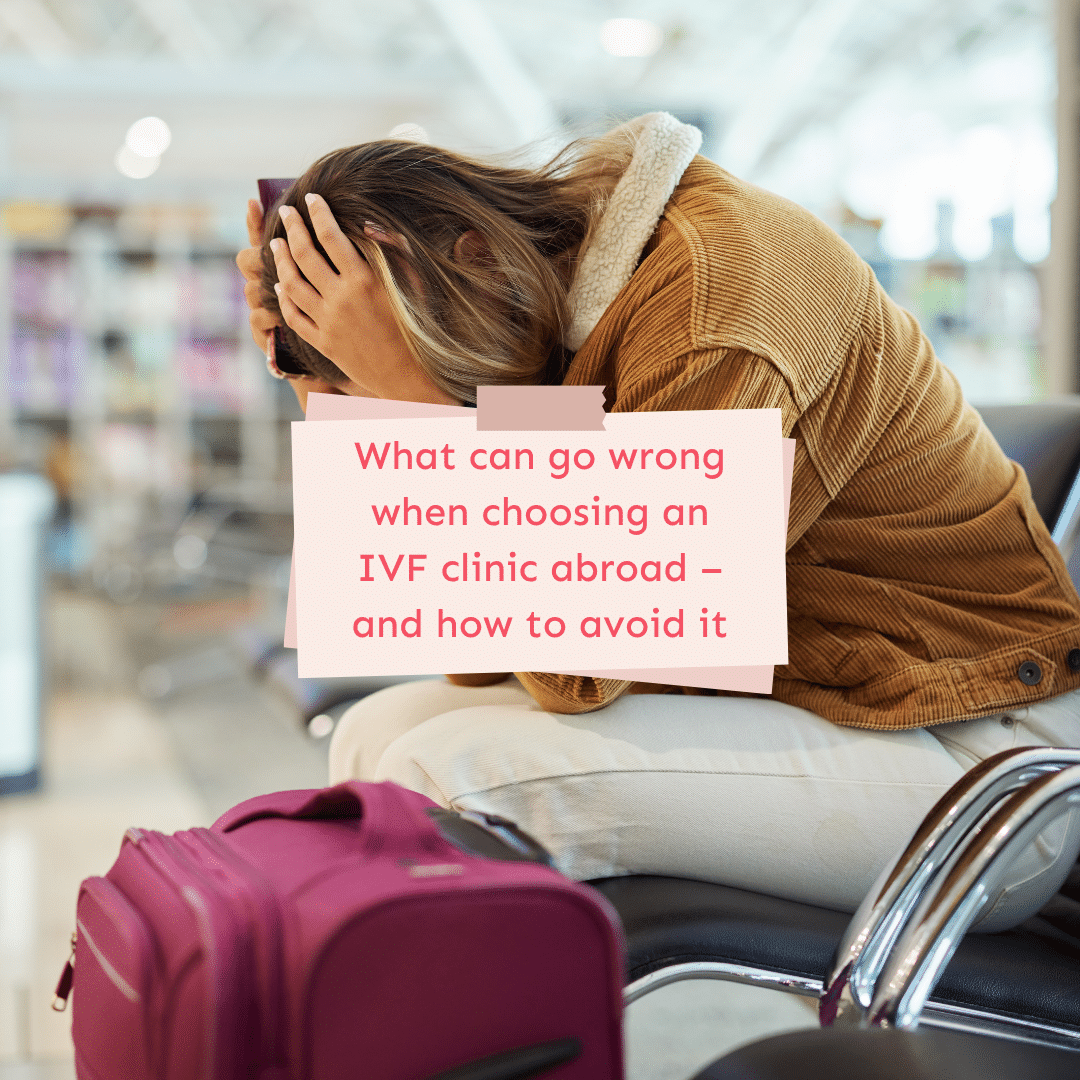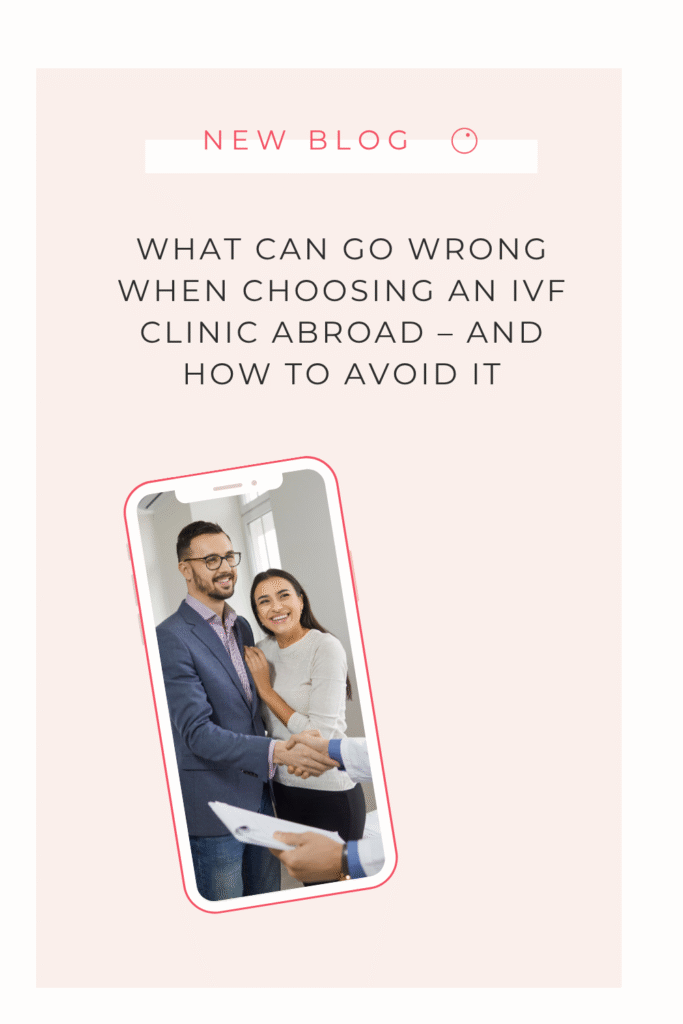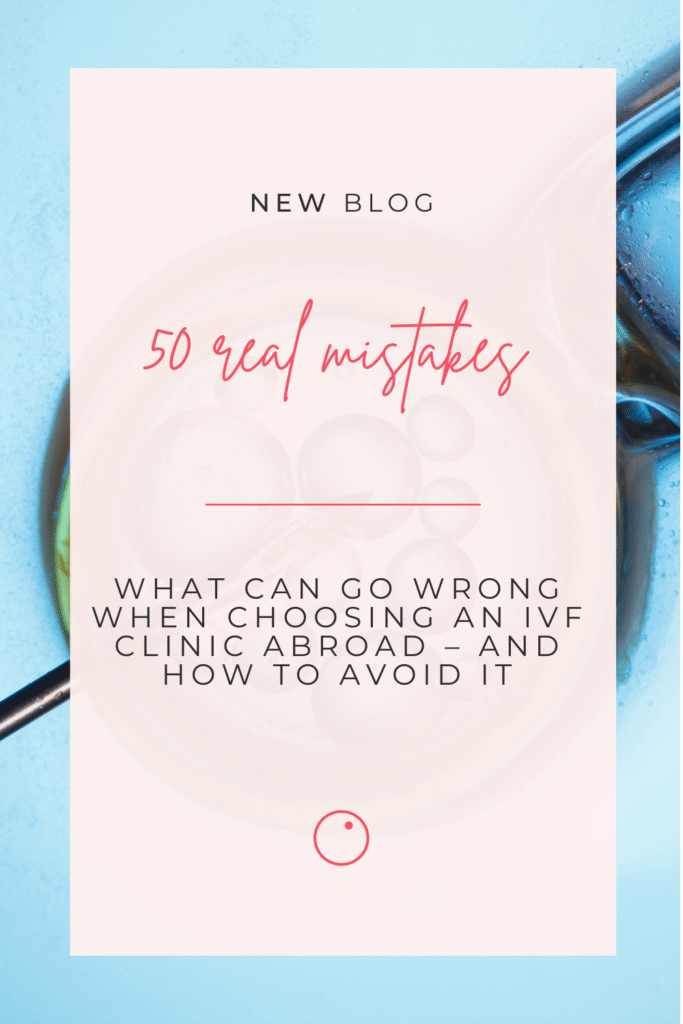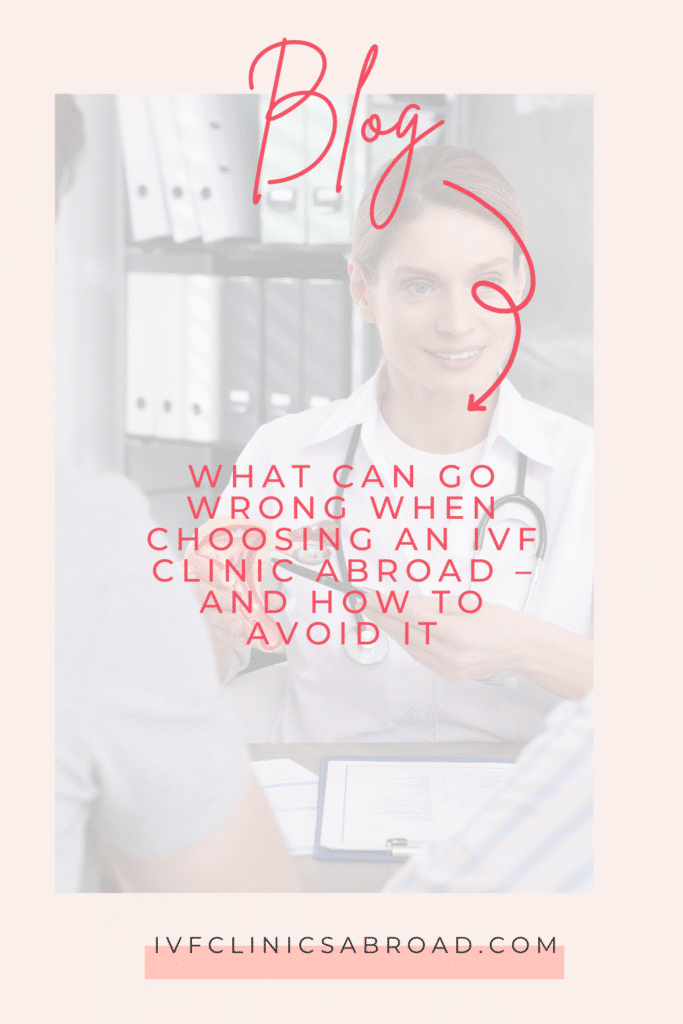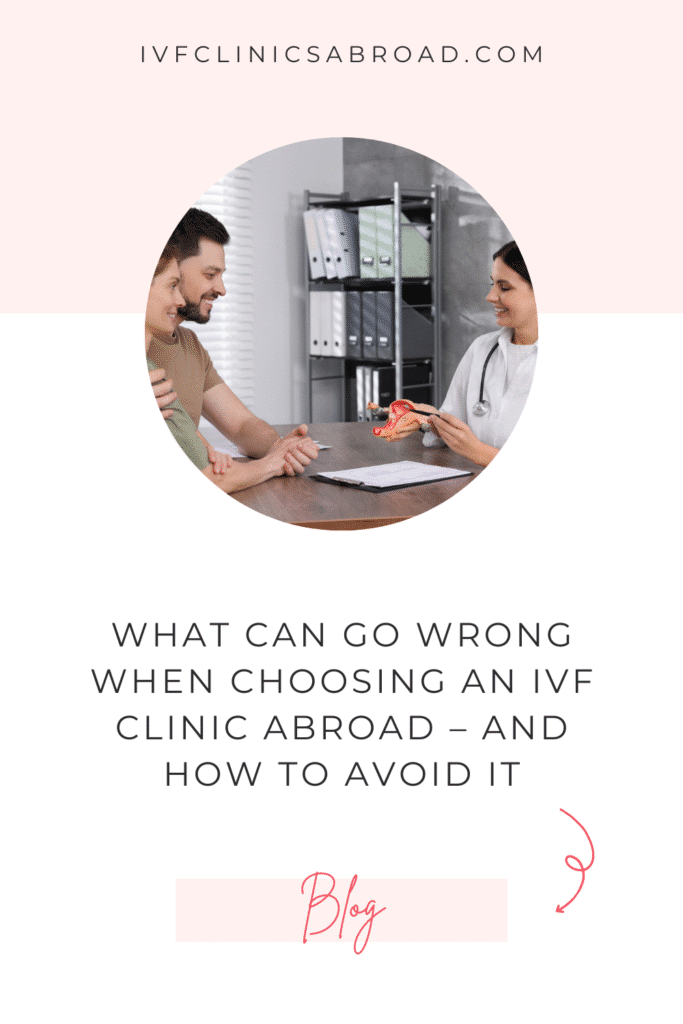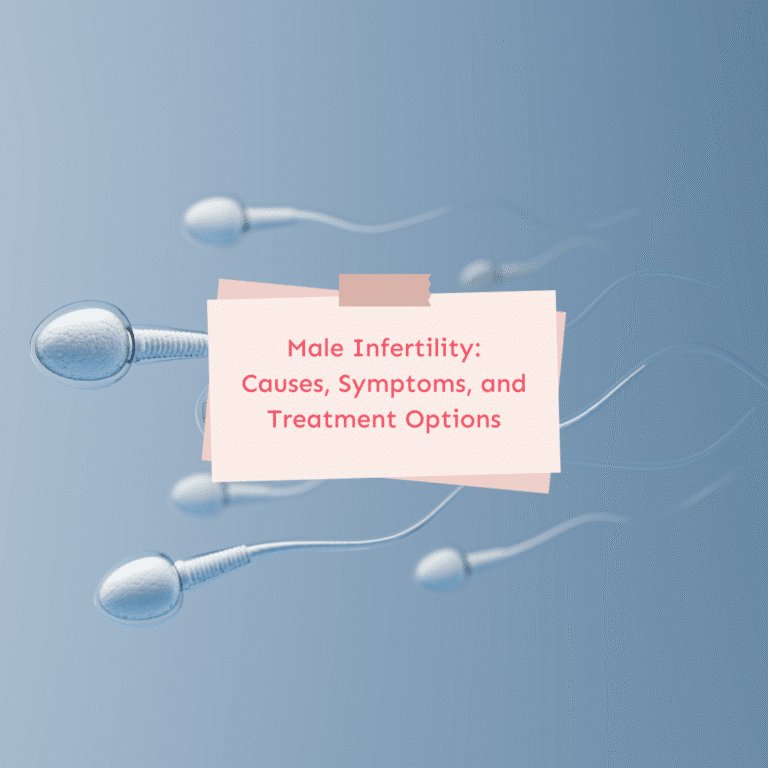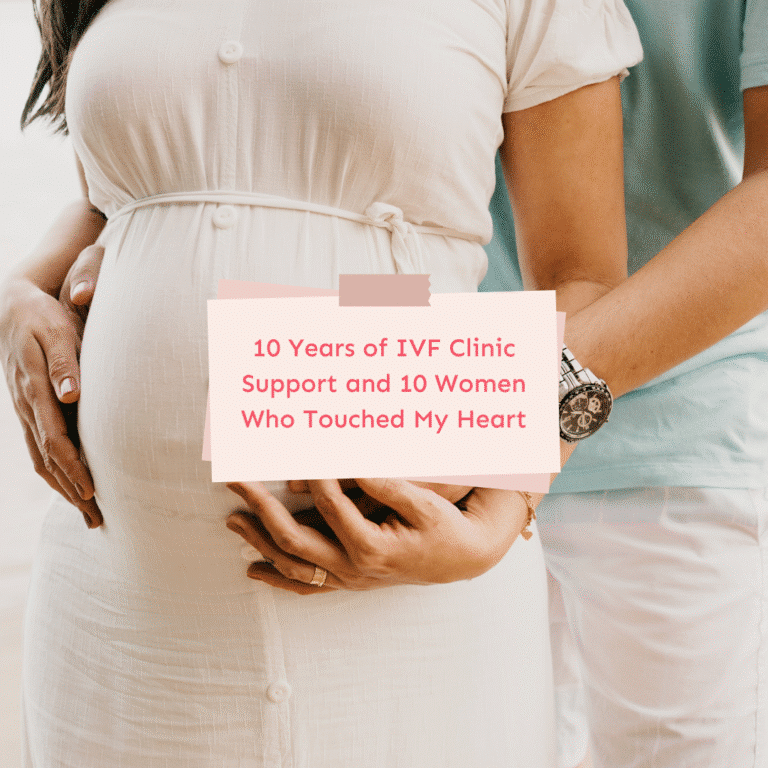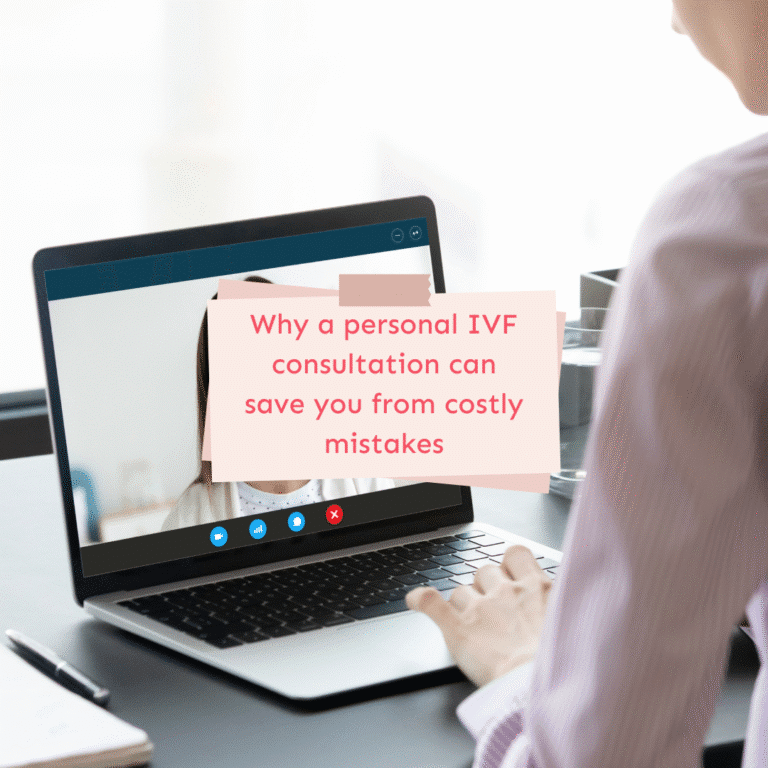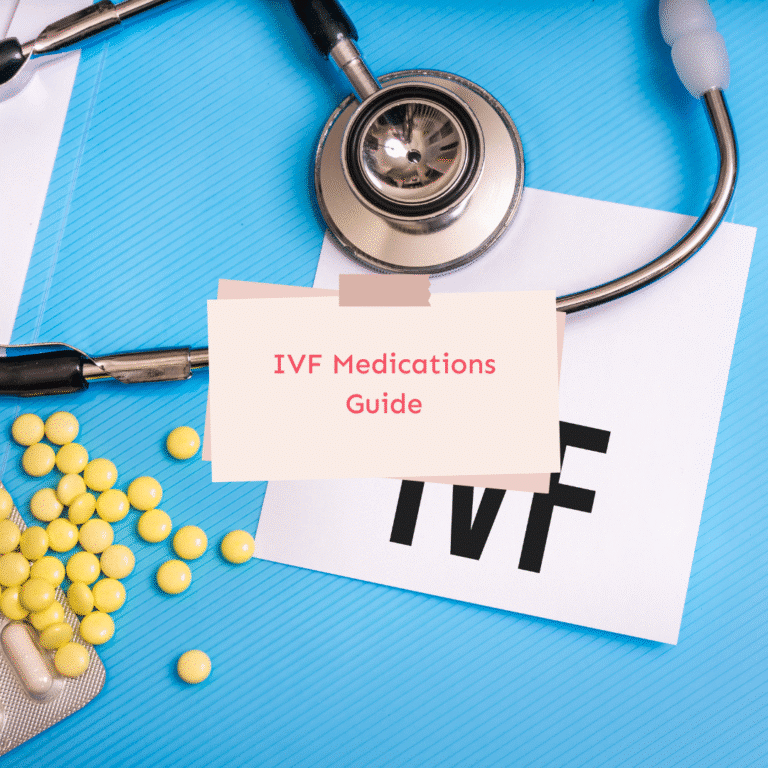What can go wrong when choosing an IVF clinic abroad – and how to avoid it
50 real mistakes I’ve seen over the years – and how you can avoid them to make your dream come true
If you’re looking for IVF treatment abroad, you already know how overwhelming this journey can feel. Between comparing IVF success rates, searching for the best IVF clinic and trying to understand what clinics actually offer, it’s easy to lose track – and even easier to make choices that won’t lead you any closer to your dream.
Over the past years, we’ve supported hundreds of women, couples and single women who were looking for IVF in Europe. Many had already spoken to a fertility doctor, searched for clinics abroad, or even started treatment – but something felt off. Others had been through more than one IVF cycle without success and were left wondering whether they had simply chosen the wrong clinic.
This guide is based on what we’ve really seen: 50 mistakes that happen again and again. Not just because people make bad decisions – but because they don’t get the information they need.
Some of these mistakes happen early, when your fertility journey starts with a quick consultation at your gynaecologist’s office. Others happen later, once you’re already in contact with an IVF clinic abroad and feel unsure whether their promises are realistic. And a few happen simply because the whole process is overwhelming and no one tells you how different clinics work – or what questions to ask.
We’ve seen all of these things up close: hidden IVF costs, unclear embryo tracking, unlicensed clinics, donor options no one explains, and confusing claims about success rates. Our hope is that this article helps you make confident, informed decisions – without pressure, without rushing, and without regret.
No matter where you are in your journey, this guide will help you avoid the most common traps when choosing an IVF clinic abroad – and take the next step with more clarity.
Why it often starts with the wrong advice at home
When your local fertility doctor says everything looks fine
1. One of the most common mistakes happens right at the beginning – when a fertility doctor or gynaecologist tells you that everything looks “normal” without actually doing in-depth tests. Unfortunately, fertility issues are often complex, and a quick scan or a few hormone checks may not be enough to understand what’s really going on. But because many of these tests are time-consuming, not covered by insurance, or even uncomfortable to explain, they are skipped far too often. That’s how many people lose valuable time – months or even years – without knowing it.
2. Some doctors are also influenced by what they’re allowed to say – or not say. In countries like Germany or Switzerland, for example, certain treatment options are legally restricted. A doctor might know that egg donation or embryo donation could be the best option for you, but they are not legally allowed to suggest it. That’s why many patients never hear about donor programmes or advanced testing until they start looking into IVF clinics abroad.
3. Another common issue: the focus is often placed on the woman first, while the male partner is only checked later – sometimes not at all. But fertility is always a shared topic. A full sperm analysis should be part of the first steps of any fertility treatment, not something that comes later. Sadly, we still hear from patients whose IVF treatment abroad failed – only to find out later that severe male factor infertility had never been diagnosed.
Why basic fertility checks are often skipped or delayed
4. Some doctors suggest social freezing as a good idea – even if you’re already in your late thirties. But egg freezing after the age of 35 can be difficult, expensive and often disappointing. Many people hear about it too late. And even if you’re over 40, some clinics promote new “rejuvenation” techniques that sound promising, but are not backed by data. When the pressure is high and time feels limited, it’s easy to fall for promises that don’t help in the end.
5. Occasionally, we also see doctors who – knowingly or not – give patients false hope. Not because they want to harm anyone, but because they are used to saying what patients want to hear. Many people feel reassured when a doctor says “let’s just try one more time” – even if all signs point to the fact that a different treatment option would make more sense. Choosing IVF, especially with donor eggs or advanced diagnostics, requires honest conversations. But these don’t always happen.
6. There’s also the financial side. In many countries, especially Switzerland, fertility treatment is not covered by insurance. That means doctors may hesitate to suggest certain tests or protocols, because they know it would be too expensive for many patients. But just because something isn’t covered doesn’t mean it’s unnecessary.
7. And lastly – and this might be the hardest part – there’s just not enough structured support for people who are struggling to conceive. Fertility problems are becoming more common. More women have their first child over the age of 30. More couples try again after 35. Miscarriage rates increase. Male fertility is declining. The science is evolving, but the laws and the public health system are not keeping up. Most patients are left alone to figure it out themselves. And many never even realise how different their options could look if they considered treatment abroad.
What doctors don’t tell you about treatment abroad
Legal limits, missing options – and what’s never mentioned
8. Most fertility doctors have no real insight into how IVF clinics abroad work. They haven’t visited these clinics, they don’t know the differences in protocols, and they have little idea of how treatment is actually handled outside their local system. That makes it difficult for them to give advice – even if they wanted to. And yet, many patients rely on their opinion, thinking it reflects the full picture.
9. Some topics are avoided altogether – especially when it comes to donation treatments, legal grey zones, or methods like gender selection. These subjects are often seen as controversial or too complex, so they’re left out of the conversation. But just because something is not mentioned doesn’t mean it’s not available or relevant.
10. Many doctors don’t know how different the legal frameworks are across Europe. They are unaware where anonymous or known donors are allowed, whether preimplantation genetic testing is an option, or how long embryos can be stored. Some don’t even know that medication prices can vary drastically depending on the country. And even if they do, they often only recommend local clinics – sometimes because they are affiliated with them, or legally restricted to referring only within their network.
Why some fertility treatment plans are incomplete from the start
11. The idea of “just trying something small first” can sound reasonable – but it’s often the wrong approach. Many patients are encouraged to start with limited options, hoping for a natural pregnancy or a basic protocol, even when the chances are clearly low. The harder conversations are postponed. But every delay can mean missed opportunities, especially when age is a factor.
12. If the issue lies with the male partner, the guidance is often vague – or completely absent. Men are rarely informed about all available options, especially if sperm quality is very low or there’s no sperm at all. In some cases, surgery might help. In others, there are alternative ways to obtain sperm – some of which are more accessible or affordable abroad. But most couples never hear about them.
13. There’s also a more subtle barrier: personal bias. Some doctors are reluctant to talk about certain treatment paths, not because they’re illegal, but because they don’t agree with them. Single motherhood, IVF after 50, or gender selection are just some of the topics that are quietly ignored. Patients are left feeling unsure, sometimes even judged – and no one explains what’s really possible if they chose to look beyond their local system.
The clinic looks perfect – but is it really a good IVF option?
Success rates, treatment costs and what overseas clinics often leave out
14. Many IVF clinics abroad advertise impressive success rates – but these numbers are often misleading. They rarely explain how the rates are calculated, which patient groups are included, or how many cycles were needed. A success rate sounds great on a website, but without knowing the context, it tells you very little about your own chances.
Annual reports from ESHRE show how clinics across Europe use different methods to define success – which makes comparisons even harder.
15. Some clinics send out prescriptions without reviewing basic medical data. They don’t ask for recent blood tests, hormone levels, or a sperm analysis – even though these are essential for planning any IVF treatment. Without proper information, a treatment plan becomes guesswork. And that can affect both safety and outcome.
16. Clinics abroad sometimes suggest multiple treatments at once – even if they aren’t needed. Many patients feel pressured into adding extra steps “just in case,” even when there’s no medical indication. The emotional vulnerability that comes with infertility is real – and sadly, not every clinic handles it with the care it deserves.
17. Add-on treatments are another grey area. Procedures like EmbryoGlue or PICSI are often offered as if they would guarantee better results. But many of these methods have not been shown to make a clear difference. Some clinics still offer them routinely – simply because they can charge more.
18. Other techniques, such as PRP or Intralipid infusions, are still experimental. Yet they are sold as part of the IVF package – without clearly explaining that there is little evidence behind them. In many cases, patients are the ones who end up “testing” the latest methods – without even knowing it.
Choosing IVF clinic abroad based on promises that don’t hold
19. A few clinics go as far as to offer guarantees – sometimes even a 95% success promise. This is highly problematic. IVF is a complex medical process. No clinic, no matter how advanced, can guarantee a pregnancy. When promises sound too good to be true, they usually are.
20. Some patients later realise that the actual treatment costs were not what they expected. Fees for medication, lab work or special services are sometimes not included in the price overview. That’s why it’s important to ask the clinic exactly what’s covered – and what isn’t. Unexpected costs can create stress at the worst possible moment.
Things that can go wrong inside the IVF clinic
When treatment protocols are unclear or too generic
21. In embryo donation, communication is often unclear – and that can lead to disappointment. Some clinics use pre-created embryos from anonymous sources that were originally intended for other couples. These may be single embryos or so-called “leftovers” from past treatments. They are often cheaper – but they also come with a lower success rate. In many cases, patients are not fully informed about the origin or genetic match of these embryos. A proper embryo donation should come from a coordinated donation by one donor couple, where all gametes – including any remaining embryos – are passed on to the recipient. This ensures better quality, a higher chance of pregnancy, and fewer ethical concerns regarding the number of genetic siblings that may exist elsewhere.
22. In certain cases, egg donation is used to improve the chances of selecting the desired gender – but this is not always disclosed. Patients may think they’re undergoing a standard IVF procedure, when in fact the clinic has chosen a donor-based approach without clearly explaining it. That’s not only unethical – it also prevents true informed consent.
23. Many clinics abroad lack modern tracking systems for handling embryos and gametes. In countries where there are no enforced standards, it’s still common for labs to work without barcode-based identification tools. Systems like RI Witness or Gidget help prevent mix-ups – but they are not used everywhere.
24. Some clinics are involved in practices that go far beyond IVF – and cross serious ethical lines. From pushing unregulated surrogacy to sourcing biological material in questionable ways, the boundaries are not always clear. While most IVF clinics operate responsibly, patients rarely know what questions to ask to feel fully safe.
25. Even the quality of egg donors can vary greatly. Some clinics accept women with poor health or insufficient screening – especially when financial incentives are strong. This puts both the donors and the recipients at risk. A good clinic should follow strict criteria – and be open about them.
26. In many cases, egg donors are overstimulated to produce more eggs. While this may seem efficient, it comes with health risks – especially if it’s done repeatedly or without proper monitoring. Ethical clinics protect their donors. Others focus only on results.
27. Coordination and follow-up are often lacking. It’s not uncommon for patients to finish a treatment abroad and never hear back from the clinic. There is no follow-up call, no review of the outcome, not even a simple message to ask how things went. For something as personal and emotional as IVF, this lack of care can be deeply unsettling.
Lack of transparency, poor quality control and no licensed staff
28. Not all IVF clinics abroad are officially licensed – and unfortunately, patients rarely know how to check this. In some regions, several clinics operate without a valid license or under unclear legal conditions. A license may not guarantee quality, but it does provide a basic level of regulation. Without it, you’re putting your treatment – and your trust – into a system that isn’t fully accountable.
29. Some clinics operate under multiple names and websites. This can make it hard to tell who is actually behind the clinic, what their experience is, or whether it’s part of a larger group. Patients may think they’re comparing different options – when in reality, they’re just seeing different fronts of the same business.
30. There are cases where a previous clinic had to shut down due to serious issues – only to reopen under a different name. This history is usually hidden from patients. The lack of transparency makes it hard to assess whether the clinic is truly safe and experienced, or simply trying to rebrand after problems in the past.
31. Many clinics still do not fully understand what it means to treat international patients. IVF abroad is not just about medical care – it’s also about communication, logistics, legal understanding and emotional support. Some clinics offer great medical services but fail to provide any help with travel, translation, or coordination before and after the treatment. That leaves patients feeling lost in a moment where they need clarity most.
32. One important difference that’s often overlooked is whether a clinic is privately run or part of a larger chain. Clinic chains tend to focus heavily on efficiency – which can come at the cost of personal attention. Patients are often routed through a rigid system, with long response times, limited access to medical staff, and standardised protocols that don’t always match individual needs. In some cases, you won’t speak to a doctor at all until the very last step. Smaller, privately managed clinics may offer more flexibility and direct contact – but patients don’t always realise how much this can affect their overall experience until they’re already in the process.
33. Some clinics use multiple embryo transfers to increase success rates – even if it means higher risks for you and the embryos. While double embryo transfer might seem like a shortcut to pregnancy, it significantly increases the risk of multiples, preterm birth, and other complications. The best IVF clinics follow medical guidelines that prioritise safety – not just statistics.
34. In many cases, the treatment plan and medication protocol are not clearly explained before you travel. You may receive your plan very late, or find out that it’s different from what you discussed. Medication combinations also vary widely from clinic to clinic – and not all protocols are equally well adapted to your specific case. Without a clear plan early on, it’s hard to prepare, ask questions or compare treatment options properly.
“Fertility treatment isn’t about luck – it’s about the right information, good decisions and the courage to keep going.”
Nathalie Wiederkehr
IVF abroad is more than just a clinic visit
Why the best IVF clinic abroad also needs to understand medical travel
35. In some clinics, the treatment protocol lacks detail or clarity – or is completely missing. Patients are expected to trust that “everything will be fine” without seeing the full plan in advance. This makes it hard to prepare properly, especially when medication needs to be organised from abroad or when time-sensitive steps are involved.
How donor choices, embryo safety and communication gaps affect outcomes
36. It still happens that no one checks in after the embryo transfer. There’s no follow-up, no contact, no question about how you’re feeling or whether the result was positive. This silence can feel brutal – especially after such an emotional experience. A good clinic doesn’t stop caring the moment the transfer is done.
37. Some clinics abroad do not collaborate with doctors in your home country. That means you’ll need to travel again just for a simple test or scan – even when it could easily be done locally. But there are clinics that actively build partnerships with local providers to help reduce travel and improve continuity of care. Ask your clinic how they handle this before you commit.
When no one explains who’s responsible for your care
38. Specialised diagnostics like an ERA test or immunological screening are often not part of the first IVF cycle – even if there were previous failures. Many patients are told to “just try once and see,” instead of starting with the most informative approach. But when implantation repeatedly fails, it can be frustrating to realise that useful tests were never even discussed.
39. Not every IVF clinic has a full team on site. Some rely on visiting doctors or part-time embryologists who work across multiple locations. That might not sound critical – but it can lead to inconsistencies, communication gaps or scheduling delays. Ideally, your clinic should have permanent staff who are present and reachable during key stages of your IVF treatment.
40. In some cases, you’ll only meet the coordinator – not the medical team. While coordinators are essential, they should not replace direct access to doctors. If you can’t ask your own questions or speak to someone who knows your case medically, it’s hard to feel safe and understood. You’re not just booking a service – you’re trusting someone with your body, your time and your hope.
41. Response times can vary dramatically. Some clinics reply within hours. Others take days – or don’t reply at all unless you follow up repeatedly. That’s not just inconvenient. When you’re going through IVF abroad, timing is everything. Medication schedules, travel bookings and emotional stress all depend on clear and timely communication. If you’re chasing answers all the time, it might not be the right IVF clinic for you.
What patients often get wrong when looking for IVF
Trusting reviews, rankings or forums without context
42. It’s easy to rely on what others say – especially when you’re feeling overwhelmed. But online reviews, social media posts or forum discussions only reflect one side of the story. Most of them are based on very personal experiences. One woman may have had a wonderful result and now sees that clinic as perfect. Another may have had a failed cycle and writes a scathing review – without knowing whether the issue was medical, personal, or just timing. Neither tells the full story. What’s missing in most reviews is context: age, diagnosis, type of IVF treatment, donor involvement, or medical complications. Without that, comparisons become emotional – not factual.
43. Forum advice can also be confusing. In most cases, it’s shared with good intentions. But people often repeat things they’ve read elsewhere or project their own journey onto others. That creates unrealistic expectations or unnecessary fear. And it makes it harder to feel confident in your own decisions – especially when everyone seems to say something different. Forums are a place to share, not to plan medical care.
Comparing IVF success rates without knowing the full picture
44. Many patients compare IVF success rates between clinics as if they were fixed numbers – but they forget to look behind the scenes. A clinic may have had excellent results in the past, but key people – like senior embryologists or lead fertility doctors – might no longer be working there. Success depends on people, not logos. The numbers on a website don’t always reflect the current team or quality. And clinics rarely mention when important staff members leave or rotate.
Choosing the best fertility clinics abroad – what really matters
Ask the clinic the right questions before starting your IVF treatment
45. One of the most common mistakes is not knowing what to ask. Many patients are polite, hesitant, or simply unsure – and clinics don’t always volunteer the most critical details. But there are questions that can make all the difference. If you’re unsure where to start, we’ve created a practical guide with clear, real-world questions to ask during your research. Here’s the full list of questions to ask your IVF clinic – so you can feel more prepared and confident when comparing options.
What you need to know before deciding on fertility treatment abroad
46. Many patients only speak to one doctor or clinic – and take that first answer as the full truth. But in fertility care, there is rarely only one right option. Getting a second opinion is not about mistrust. It’s about seeing the full picture and understanding your own possibilities. Especially when the situation is more complex – previous failures, age-related issues, donor egg options – hearing different perspectives helps you make better, more informed choices.
47. Some women avoid difficult questions because they touch on personal fears or social taboos. Topics like being a single mother, starting treatment at 45+, or considering gender selection are not easy to bring up – even with a doctor. But avoiding them doesn’t make the need disappear. It just delays the planning. Whatever your situation is, there’s nothing shameful about wanting clarity, options, and a plan that fits your life.
What no one tells you about IVF treatment cost and emotional timing
Why good IVF means more than saving money
48. It’s understandable to look at prices first – but comparing clinics only by cost can become very expensive in the long run. Some lower-cost clinics cut corners, use outdated technology, or follow rigid protocols. If your IVF treatment fails, you don’t just lose money – you lose time, energy and emotional strength. Good IVF means more than getting a good deal. It means getting the right support, the right team, and the right approach for you.
What happens when you wait too long, or believe you still have time
49. Many people hold on to the hope of natural conception – even when time is already running short. That hope is beautiful and human. But at some point, it can get in the way of action. We often speak to women who say: “I wish I had done this one year earlier.” Especially after 43, chances with your own eggs drop sharply. And by the time you decide to go ahead with fertility treatment abroad, options like egg donation or embryo adoption may already be the only realistic paths left.
You’re not alone – how to move forward without regret
Why it helps to work with someone who really knows clinics abroad
50. Every fertility journey is different. Age, diagnosis, life situation – and also how much time, money and emotion you can invest. That’s why no online list, no clinic website and no general advice will ever fully match what you need. But working with someone who knows the clinics, the systems, the medical staff and the fine print can save you from the most common mistakes. It’s not about finding the “perfect” clinic – it’s about finding the one that fits you.
Get the facts you need – and choose the best IVF clinic for your journey
If you’re currently comparing clinics abroad, considering donation options or trying to understand what’s even possible in your situation – we’ve created a free, practical guide that walks you through real examples, legal differences between countries, and the treatment paths that many women choose. It’s not a recommendation – but a starting point.
You can download the IVF destination guide here, or reach out for personal guidance if you feel stuck or unsure. Sometimes it just takes the right information – and someone who truly understands this journey – to help you take the next step.

